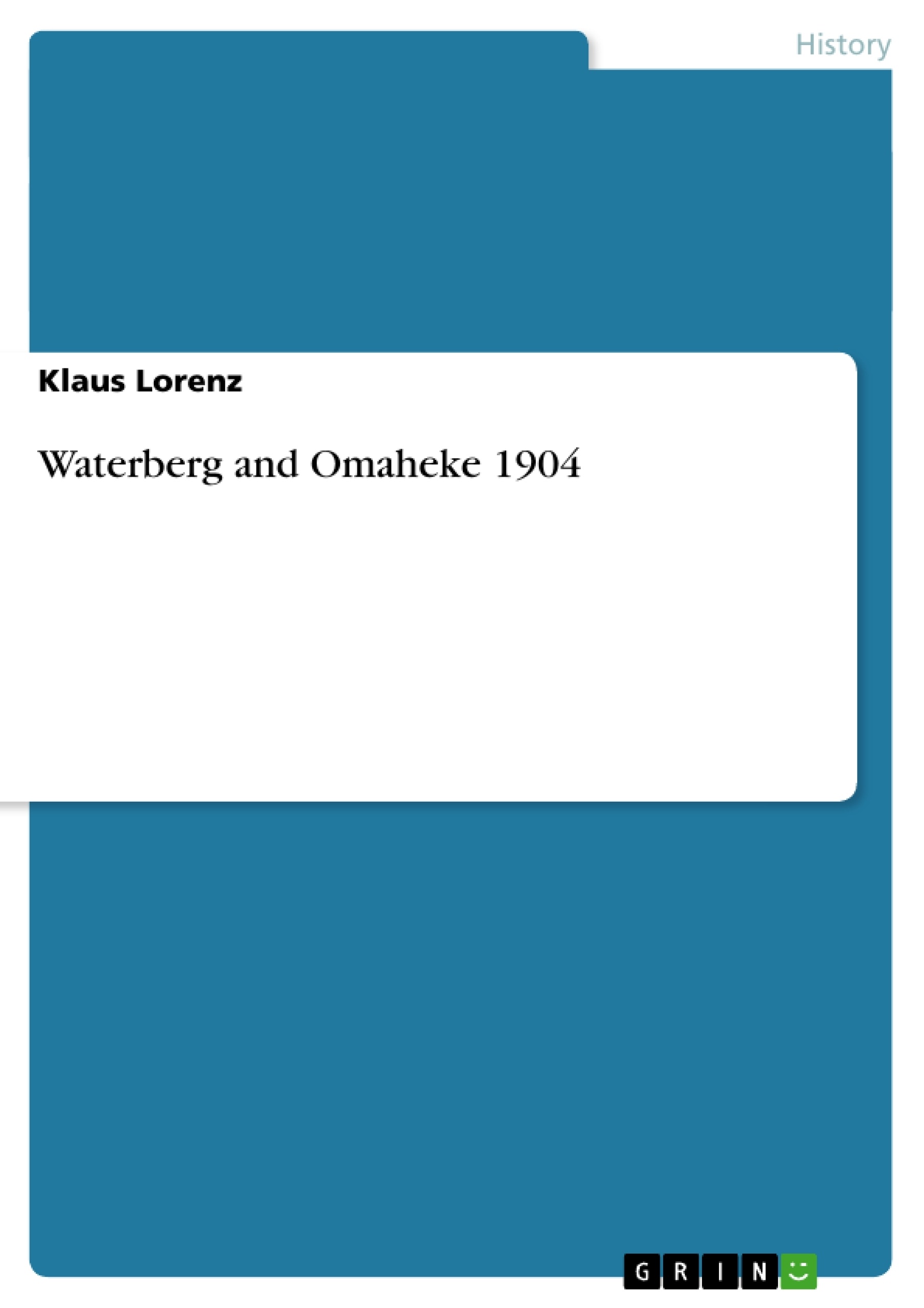Waterberg and Omaheke 1904
By Klaus Lorenz, M.A.
Introductory remarks
The uprising of the Herero which broke out on 12 January 1904 surprised all Europeans in South West Africa. The warning words of Karl Dove of the year 1896 werde forgotten. He had drawn attention to the likely main reason of a violent resistance movement of the Herero: The failure of the balancing act of Governor Leutwein in the question of land between expropriation of the Herero in whatsoever form by own will, by sale or under controlled pressure of the government and the now increasing spreading of European landholding at the expense of the Africans. The fact that the Africans were forced into reservations made it clear to them that the former freedom of roaming around with their large herds of cattle, their most valuable property and expression of social prestige, from water point to water point and from pasture to pasture in the borderless Damaraland was over.
The violent resistance against the state-decreed restrictions in the question of land erupted in more than 120 murders attended with robbery against Germans exclusively. The system of Colonel Leutwein for the administration of the colony had foundered on the central problem of the question of land, lacking sufficient resistance against the pressure of the settlers in favor of the rights of the Africans and their right to exist. The Africans had lost confidence in the German partner.
Helmut Bley has furnished proof that the uprising reached the dimension of war at a very early stage – „the first war of Wilhelminian Germany since 1871.“ The immediate reinforcement of the Imperial colonial troops on the own initiative of the Empire without participation of Windhoek was by far beyond the departmental competencies of the Colonial Department of the Foreign Office. Governor Leutwein was not longer consulted, fundamental measures were taken on the basis of the nervous initiatives of the Emperor and the Supreme General Staff. The second phase of German colonial policy in Southwest Africa started, the experimental stage was replaced by the stage of conquests.
The instrument of power of the European colonial power with its officers/civil servants did not longer exercise the dual civilian and military capacity – the colonial troops were not longer an administration. In accordance with its legal mission the sole role as an instrument of a policy which was not longer pursued to a large extent independently in Windhoek but developed with other aims in Berlin was taken over due to the uprising of the Herero, not on the own initiative.
German colonial policy in Southwest Africa together with the activities of the Imperial Colonial Troops stand under the verdict of the first mass genocide of German history – of the Herero people - already in contemporary political discussions and especia1ly in recent historiography since the events at the Waterberg Mountains and in Omaheke.
Frequently asked questions: Waterberg and Omaheke 1904
What triggered the Herero uprising in 1904?
The uprising was triggered by the failure of Governor Leutwein's land policies, which resulted in the expropriation of Herero land through sales or government pressure, leading to increased European landholding at the expense of the Africans. The Africans were forced into reservations, restricting their freedom of movement with their cattle.
What was Karl Dove's warning?
Karl Dove warned in 1896 about the likely violent resistance from the Herero due to the land issue and the increasing spread of European landholding.
How did the Herero respond to the land restrictions?
The Herero responded with violent resistance, resulting in over 120 murders of Germans and robberies.
What was Helmut Bley's assertion about the uprising?
Helmut Bley stated that the uprising reached the dimension of war early on, being "the first war of Wilhelminian Germany since 1871."
What was the impact of the uprising on German colonial policy?
The uprising led to the Empire reinforcing colonial troops without Windhoek's participation. It marked a shift from an experimental stage to a stage of conquests in German colonial policy in Southwest Africa.
How did the role of colonial troops change after the uprising?
The colonial troops transitioned from a dual civilian and military capacity to primarily an instrument of a policy directed from Berlin, not Windhoek.
What is the historical verdict on German colonial policy and the Imperial Colonial Troops in Southwest Africa?
German colonial policy and the actions of the Imperial Colonial Troops are viewed as the first mass genocide in German history – of the Herero people, especially concerning the events at Waterberg Mountains and in Omaheke.
What is the "Omaheke legend"?
The "Omaheke legend" claims that the colonial troops forced the Herero into the waterless Omaheke after the battle at Waterberg on 11 August 1904, leading to their death from thirst and starvation, constituting genocide. This legend was created by the Supreme General Staff in Berlin and later developed by historians in the GDR.
Who is Horst Drechsler and what is his perspective?
Horst Drechsler was a historian from the GDR who contributed to the "Omaheke legend" by asserting that the German colonial troops deliberately forced the Herero into the Omaheke desert to die.
- Quote paper
- Klaus Lorenz (Author), 2000, Waterberg and Omaheke 1904, Munich, GRIN Verlag, https://www.grin.com/document/108148



